By 6 p.m. Tuesday, 237,888 New York City residents had voted in the unusual August primary, where some neighborhoods were home to heated State Senate and Congressional races while others had no candidates on the ballot at all. Polls close at 9 p.m.
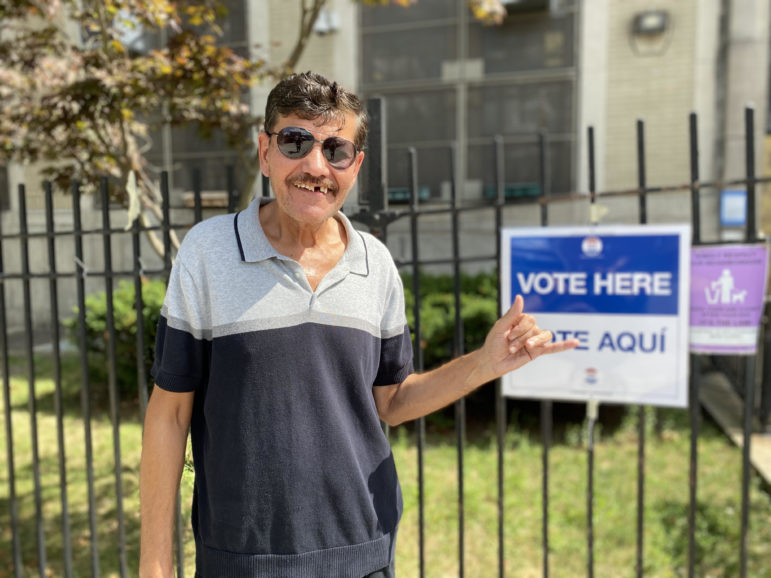
David Brand
Lifelong Bronx resident Sam Dascoli, outside P.S. 108 in Morris Park.By 2:45 p.m. Tuesday, the polling place at P.S. 108 in the Morris Park section of The Bronx was a ghost town.
Just 57 voters had cast their ballot, even though the district is home to one of New York City’s few vacant State Senate seats. The Democratic primary for the 34th District pits Nathalia Fernandez, an assemblymember backed by the Bronx County party, against progressive political consultant Christian Amato and conservative former district leader John Perez.
One woman who lived across the street went to pick up a sandwich from a local takeout place. She had no plan to vote. Poll site coordinator Alan Finelli wondered if the location would break 100 ballots.
In the half hour City Limits spent outside the school, just three voters exited. And only one, lifelong Morris Park resident Sam Dascoli, would talk. A Democrat, he said he was voting to “get guns off the street.” He declined to say who he voted for but said he was satisfied with the choice of candidates. “Before you complain, you have to vote,” he said.
But not everyone subscribed to that philosophy Tuesday, the second of two primary elections in New York this summer—the result of a court ruling in a drawn-out redistricting process to redo the state’s legislative maps. The primary for State Assembly and governor was held in June, while races for State Senate and Congress were pushed back to August, a traditionally sleepy time of year in the city, prompting predictions of poor voter turnout.
“Voting isn’t really on anyone’s radar in August,” political organizer Michael Lange told City Limits the day before the election.
By 6 p.m. Tuesday, 237,888 people had voted in the five boroughs, including those who cast ballots during the week of early voting, the city’s Board of Elections said on Twitter. Polls close at 9 p.m. The June primary, comparatively, saw 474,430 Democrats and 52,308 Republicans vote in the gubernatorial race.
But some city Congressional and State Senate districts had no contested primaries at all on Tuesday, with just 2.3 million city residents eligible to vote, according to the NYC BOE (of more than 3.7 million Democrats and 566,493 Republicans registered here).
A few districts home to high-profile races may on their own see a boost in voters compared to June, Lange predicted, like Congressional Districts 10 and 12, where well-known candidates are battling to represent neighborhoods in Manhattan and Brooklyn.
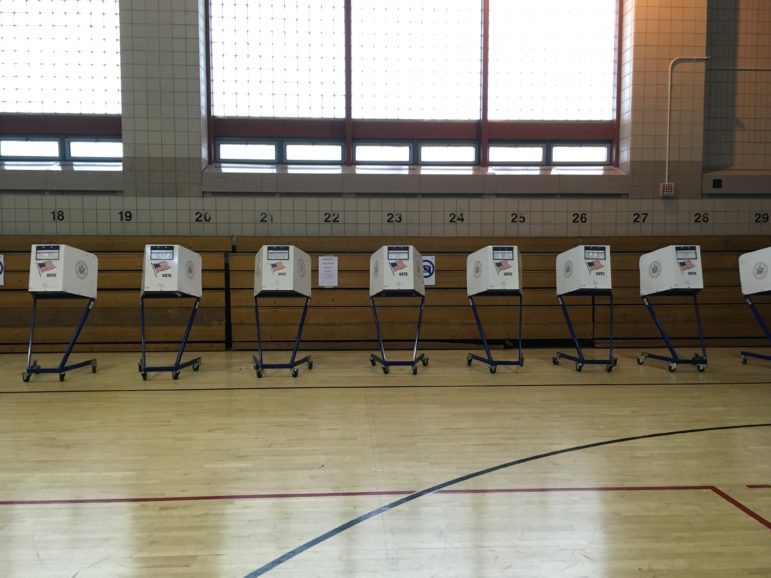
Daniel Parra
Long Island City High School in Queens.Over in Kingsbridge, in the Bronx’s 33rd State Senate District, the poll site at P.S. 46 was one of the livelier scenes, as campaign workers representing rival candidates—incumbent State Sen. Gustavo Rivera and challenger Miguelina Camilo, who has the backing of the Bronx County Democrats—held down opposite corners and handed out literature in Spanish and English.
Just under 150 voters had visited the site by 1:40 p.m. with more filtering in and out as City Limits conducted interviews outside. Just 10 people stopped to talk, with three saying they cast a ballot for Camilo, one for Rivera and six who declined to reveal their choice.
Kingsbridge resident Andrea Goldman visited the polling place with her son,saying she was undecided heading into the booth. When she exited, she said she went with Camilo, but for no particular reason.
“We just need to keep it Democratic,” she said, adding that “equal rights” and reproductive rights were her top concerns.
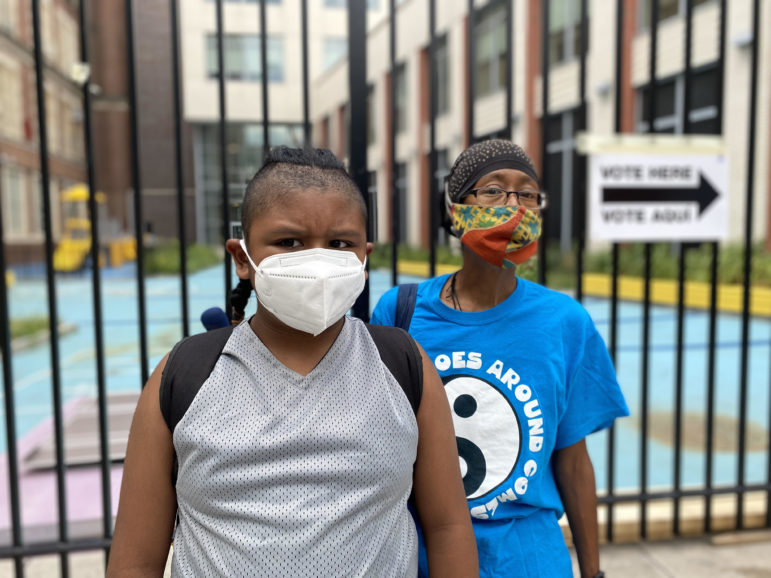
David Brand
At PS 46 in Kingsbridge, Andrea Goldman voted with her son Kyrie Busby.Local elementary school teacher Caitlin Cargill, on the other hand, went with Rivera. She said she recently met with the progressive incumbent to get help resolving a problem some of her students were facing. She also said he has been active in the community.
“We usually don’t get door-to-door knockers around here,” she said. “But he has been out and about.”
Other voters were happy to discuss the issues that drove them to the polls, even if they wanted to keep their vote in the contentious race a secret. “Guns are the issue,” said Christopher Craig, 55, who recently moved to nearby Bedford Park.
Retired NYPD Det. Billy Massey also said addressing the rise in crime since the start of the pandemic was his main concern. But Massey, 72, said exercising the key constitutional right was reason enough to head to the polls.
“We couldn’t vote in 1964,” said Massey, who is Black, and talked about growing up in Georgia and Harlem during the Civil Rights Era. “I vote whenever I can. Whenever there is an election. It’s my right to vote.”
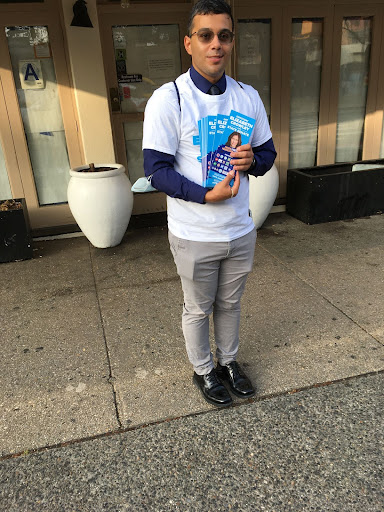
Daniel Parra
Dylan Cepeda, 29, a volunteer for Elizabeth Crowley’s campaign in Queens.Over in Queens, another competitive State Senate race unfolded in the newly drawn 59th district, dubbed the “tri-borough,” which covers Long Island City, Astoria west of Steinway Street and south of Ditmars Boulevard in Queens, as well as Greenpoint in Brooklyn and a bite of Manhattan’s Midtown East.
Five candidates are on the ballot, but two—Francoise Olivas and Nomiki Konst—dropped out. The candidates most actively vying for the seat are former Councilwoman Elizabeth Crowley and Democratic Socialist of America (DSA) organizer Kristen Gonzalez.
Dylan Cepeda, 29, was standing on the east corner of 30th Avenue and 29th Street giving out flyers for Crowley’s campaign. “Voting is picking up,” he said, feeling confident about his candidate’s chances.
But the closest polling place to where Cepeda was, P.S. 17, showed otherwise: by 9:45 a.m., just 63 votes had been recorded on the site’s three scanners, according to coordinator Eric McBlane.
Stef McGraw, 31, volunteered for Gonzalez nearby. Also a DSA member, she joined Gonzalez’s campaign in the spring, driven by the candidate’s proposals on climate change, housing, and reproductive rights.
Danielle Castaldi-Micca, 42, also cited the recent change in abortion law as her reason for voting Tuesday; she voted for Gonzalez. So did Kloe Kalthi, 26, passport in hand. “It’s the first time I’ve ever voted,” she said.
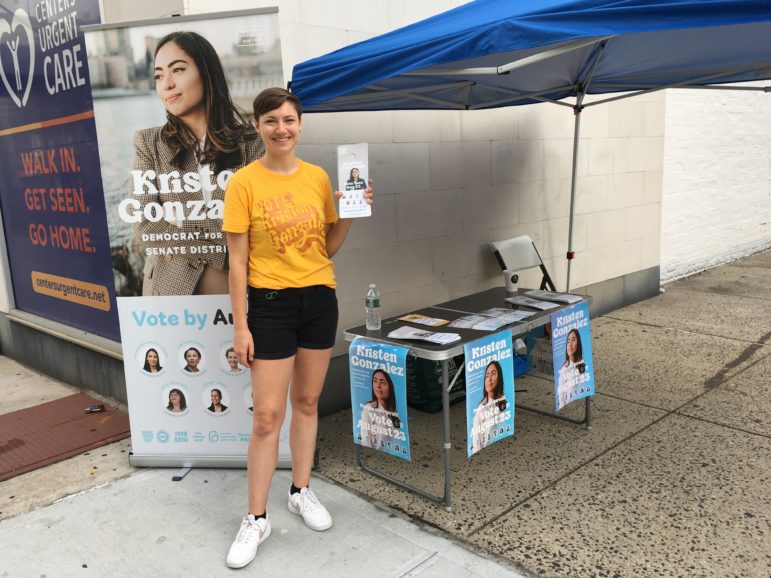
Daniel Parra
Stef McGraw, 31, a volunteer for Stat Senate candidate Kristen Gonzalez in Astoria, Queens.








